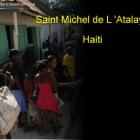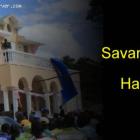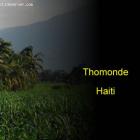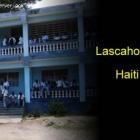ADVERTISEMENT
violence - Haiti Observer Blog
violence, Haiti Observer Blog. Read the following articles about violence
Non-Government Organizations Combating Gender-Based Violence in Haiti
Haiti, which suffers from the worst poverty in the western Hemisphere, frequent natural disasters, and an inconstant government, has been more prone to gender-based violence (GBV). In the first years following Aristide's expired second-term, 35,000 women were raped in a power grab for political dominance. And Haiti's history discloses that in the aftermath of 60 rulers over-thrown or assassinated, many rapes occurred as a result of the violence.
Statistics gathered by non-government organization (NGO), United Nations Development Program (UNDP), documented that Haiti experiences one of the highest percentages of GBV perpetrated on women. An alarming 72% of young Haitian girls have been sexually assaulted. Another NGO, Inter-American Commission on Human rights, discovered that 90%-plus Haitian women have experienced some variation of violent assault on their persons.
Tent Resident, Civil Merius, beaten to death by Haiti police
It is reported that Civil Merius, one of the residents of Camp Acra et Adoquin Delmas 33 has been beaten to death by police after he participated in a protest against arson attack on the temporary camp that houses over 30,000 Haitians. The camp is a temporary residence for these people after their homes were devastated by the earthquake of 2010. Darlin Lexima, another camp resident was also reported to have been beaten up by the police and taken in custody but Darlin did not participate in the protest. However, Darlin was later released by the police without any charges.
President of Haiti - Henri Namphy
Born on November 2nd 1932 at Cap- Haitien, Henri Namphy was another military leader who became the president of Haiti. In the army he rose to the post of a general. His first stint in the political area was as the President of Haiti during a period where the interim body ruled.
Interim Council
The interim body was the National Council of Government and they ruled from February 1986 to February 1988. This interim council consisted of six civilians and six military personnel. This interim body assured elections and reforms that would be people friendly.
Jean-Bertrand Aristide, first democratically elected president of Haiti
Jean Bertrand Aristide was the first democratically elected president of Haiti. Born on July 15th 1953, Aristide grew up in dire poverty. His father died when he was three months and his mother moved to Port-au-Prince for a living.
Started Off As Priest
Seeking a better life he was put into the Salesian order of priest and studied in their colleges. For his studies he traveled to many countries in Europe. Jean Bertrand Aristide returned to Haiti for his ordination as priest. He was made curate of Saint Jean Bosco, a small parish in Port-au-Prince.
Why do People burn tires and block traffic During Protest in Haiti
Lack of Basic Services Drives Violent Protests
In Haiti violent protests are a way of life. Haiti, a small island, is home to a population of only 10 million, indicating just how desperate Haitians are to get basic services. Violent protests happen many times in small and larger villages across Haiti.
Typically, protestors set tire-fires in streets, obstruct traffic with rocks, toppled-over cars, and garbage cans, and destroy property. Regrettably, such protests regularly come under fire from three categories of people.
The government of Haiti is usually not in position to help the population. It takes acts of desperation by Haitians to get the Government to pave a road, supply electricity, or distribute food to them.
Poverty And Crime In Cite Soleil
Comfortable living space, safety, security and luxury are some of the things that are uncommon among people living in Cite Soleil, an extremely poor town in the Arrondissement of Port-au-Prince in Ouest Department. As a matter of fact, it is considered one of the poorest and most dangerous towns in Haiti.
Around 400,000 residents live in Cite Soleil without a decent access to electricity. The sewerage and canal systems in the town are in poor condition, while only a few businesses are open to serve the residents. There are some hospitals and only one school. While half of the houses in Cite Soleil were made of cement and metal roof, the other 50% were makeshift shelters built in materials that residents have scavenged.
Brignol Lindor Journalist Assassinated
Haiti under former President Jean-Bertrand Aristide, despite being under a democratic form of government for the first time, was shrouded in chaos and violence. Aristide's term in office before being successfully ousted via a coup d'état in 2004 was met by most Haitian citizens with criticism and protest because of his supposed poor leadership and corruption, as well as his inclination to violence. The former president and Catholic priest's government has also been associated with several extrajudicial killings which elevated further the anger and disappointment of thousands and thousands of Haitians. The most popular of these is the brutal murder of well-known Haitian journalist Brignol Lindor.
Warning To Haitians Visiting The United States
A warning has been issued to citizens of Haiti against all non essential travel to the United States especially considering the current situation prevailing there. In Washington D.C. the highest number of hate crimes has been committed. To respond to emergencies or crimes, the local authorities have limited abilities in certain areas.
Reasons To Avoid Travel
Shootings on a mass scale, gun violence, depression at high rate, ADD or Attention Deficit Disorder and epidemic rates of people getting overweight, etc are on the rise in the US. Citizens of Haiti are urged to exercise caution while visiting US.
PNH Agent Pierre Paul Maceus indicted for the Death of student Damael D'Haiti
A case involving the death of a State University of Haiti student has moved forward with the indictment of National Penitentiary Administration agent Pierre Paul Maceus. Government Commissioner Me Lucmane Delile headed the indictment, saying that there is enough evidence showing Maceus' involvement with the death of 4th year student Damael D'Haiti during an event conducted by the Faculty of Law and Economics. Maceus is a young officer who was also a student at the university. According to previous reports, Pierre Paul Maceus was at the event too and had an encounter with the victim. Delile, however, said that the Central Directorate of the Judicial Police has yet to recover the weapon used to kill D'Haiti.
Mob Violence In la Plaine and Les cayes over Petty Thefts
In recent months, outbreaks of senseless violence have occurred in Port-au-Prince and Les Cayes. Angry crowds of people have beaten to death young people they suspected of thievery, for something as minor as the theft of a mobile phone.
Saturday last, Port-au-Prince police reported cremated remains of two suspects and hanging of a third, by hostile bands of citizens. In La Plaine, police discovered incinerated bodies of two victims hog-tied, and a third also burned and hog-tied, found on Route National 2, near Port-au-Prince. In another violent incident in Santo, three young suspects accused of stealing motorcycles--in which one suspect escaped--were stoned and beaten with tire irons and set on fire.
Our objective is to share with you news and information about Haiti and the people of Haiti. Traditions, habits and the way we were or grew are alive in this site. We highly recommend that you Subscribe to our Newsletter and also share with us some of the things that are memorable and made us unique people.

 Saint Michel de L 'Atalaye
Saint Michel de L 'Atalaye  The Town of Savanette, Haiti
The Town of Savanette, Haiti  Newsletter
Newsletter  Thomonde, Haiti
Thomonde, Haiti  Lascahobas, Haiti
Lascahobas, Haiti